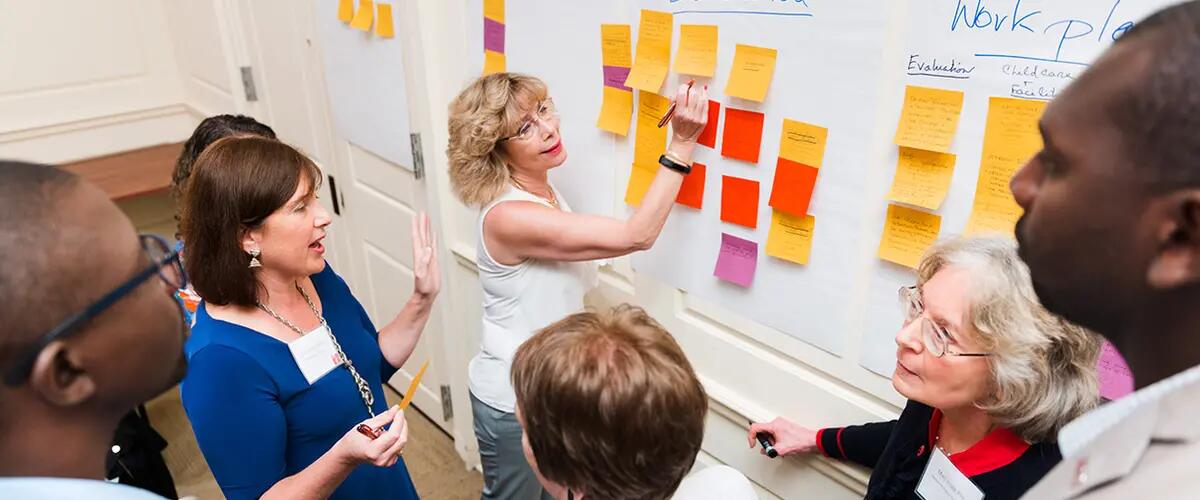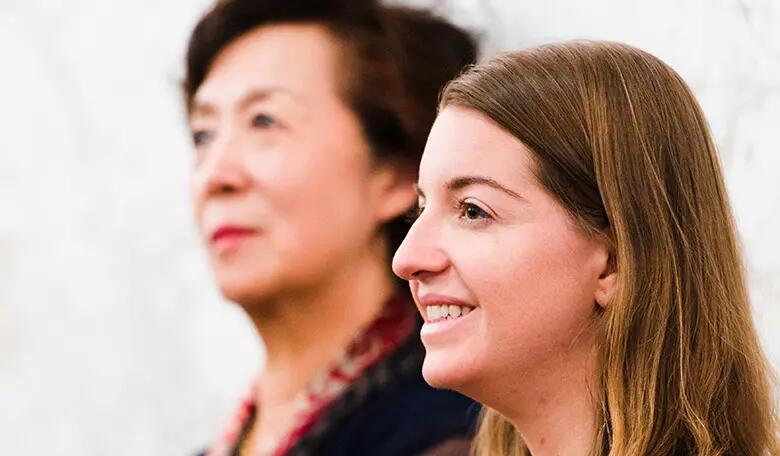
17 Rooms-U inspired actions for universities to take to help achieve the UN's Sustainable Development Goals.
Academic leaders show commitment to University Global Compact at Rutgers event
Administrators and faculty members from universities around the world gathered at Rutgers University-Newark on Sept. 23 to collaborate on ways higher education can support the United Nation’s 17 Sustainable Development Goals and commit to the emerging University Global Compact Initiative.
College professors, deans streamed into 15 Washington Street from buses that brought them from the United Nations General Assembly in Manhattan, where the University Global Compact had been announced on Sunday as a way of accelerating progress on the SDGs. The compact mirrors an earlier one formed to engage corporations in the same goals.
“Universities must play a key role in trying to solve global issues,” Yong-Hak Kim, president of Korea’s Yonsei University told the gathering. “We are creating the change-makers.”
The event, dubbed 17-Rooms U, was intended to build on the momentum of the UN’s General Assembly meeting, using the opportunity to bring university representatives together to begin collaborating over ideas for meaningful actions. It attracted 140 leaders from universities in the United States, Canada, Mexico and Europe as well as Turkey, Korea and Senegal.

Among the participants were administrators and staff from across Rutgers University. Rutgers Business School was represented by a number of staff and faculty, including distinguished professor Nancy DiTomaso, professors Michael Barnett, Can Uslay and Joanne Ciulla, and Jeana Wirtenberg, an associate professor of professional practice.
“We’ve now told the world that we’re committed to doing our part to support the 17 sustainable development goals,” Georgia Tech President Ángel Cabrera said as he briefed 17 individuals who agreed to serve as moderators. “Now,” he said, “we have to determine what that means.”
University faculty members and administrator, alike, said their role as educators and researchers make them ideal participants in the effort to support the 17 Sustainable Development Goals at the heart of the UN’s 2030 agenda for sustainable development. The goals address the economic, social and environmental infrastructure of the world, with specific actions to, among other things, eradicate poverty and create a healthy earth and gender equality.

“The one unique thing that universities share is wisdom,” said Majdi Abou Najm, a faculty member from the University of California at Davis. “Our objective quest for research and transformative data creates meaningful information and wisdom that can inform policy-making.”
John McArthur, a senior fellow from the Brookings Institute, described the 17-Rooms U event as an experiment. “The goal is not perfection,” he said. “The goal is to come up with a next step.”

After two hours of discussion, 17 representatives – one from each group formed around each global goal – spent three minutes listing some possible next steps that were generated in 17 separate, round-table discussions. The ideas ranged from embedding the 17 goals into classroom lessons and creating a dashboard where projects and campaigns can be shared to tying accreditation of universities to their actions to support the 17 SDGs.
Rutgers Business School Dean Lei Lei congratulated the visiting academics on a productive day and described how the essence of the sustainable development goals have guided the creation of institutes and long-established programs at Rutgers Business School.
Rutgers University-Newark Chancellor Nancy Cantor and Dean Lei both sponsored the event, which helped to showcase Rutgers Business School’s year-old Institute for Corporate Social Innovation.
“The 17 Rooms U event was an exciting moment for the Rutgers Institute for Corporate Social Innovation,” said Noa Gafni, who was named the institute’s executive director in August. “Our aim is to educate current and future leaders that they can do well by doing good and to connect Rutgers locally and globally.”

Professor Michael Barnett, who is academic director of the Rutgers Institute for Corporate Social Innovation, said the forum allowed universities to draw on their diverse and extraordinary pool of talent to devise ways to address the very real challenges the world faces. “We now look forward to being central to implementing these critical initiatives,” he said.
Gary Cohen, a Rutgers MBA alumnus who founded the Rutgers Institute for Corporate Social Innovation in 2018, said he was proud and excited to see the packed house that came to participate in “this collaborative project that can have so much impact.”
Cohen described universities as powerful participants to move the UN’s agenda for sustainable development closer to reality. “This is a gift,” he said, “that will benefit the world.”
The UN’s 17 Sustainable Development Goals:
- No poverty
- Zero hunger
- Good health and well-being
- Quality education
- Gender equality
- Clean water and sanitation
- Affordable and clean energy
- Decent work and economic growth
- Industry, innovation and infrastructure
- Reduced inequalities
- Sustainable cities and communities
- Responsible consumption and production
- Climate action
- Life below water
- Life on land
- Peace, justice and strong institutions
- Partnerships for the goals
Press: For all media inquiries see our Media Kit


